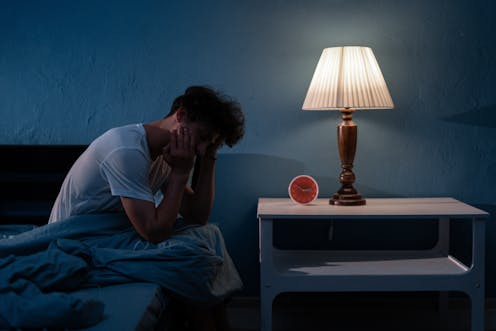Why do I need to get up during the night to wee? Is this normal?
- Written by Christian Moro, Associate Professor of Science & Medicine, Bond University

It can be normal to wake up once or even twice during the night to wee, especially as we get older.
One in three adults over 30 makes at least two[1] trips to the bathroom every night.
Waking up from sleep to urinate on a regular basis is called nocturia[2]. It’s one of the most commonly reported bothersome urinary symptoms[3] (others include urgency and poor stream).
So what causes nocturia, and how can it affect wellbeing?
Read more: Is urine sterile? Do urine 'therapies' work? Experts debunk common pee myths[4]
A range of causes
Nocturia can be caused by a variety of medical conditions[5], such as heart or kidney problems, poorly controlled diabetes, bladder infections, an overactive bladder[6], or gastrointestinal issues. Other causes include pregnancy, medications[7] and consumption of alcohol or caffeine before bed.
While nocturia causes disrupted sleep, the reverse is true as well. Having broken sleep, or insomnia[8], can also cause nocturia.
When we sleep, an antidiuretic hormone is released that slows down the rate at which our kidneys produce urine[9]. If we lie awake at night, less of this hormone is released[10], meaning we continue to produce normal rates of urine. This can accelerate the rate at which we fill our bladder and need to get up during the night.
Stress, anxiety[11] and watching television late into the night[12] are common causes of insomnia.
Effects of nocturia on daily functioning
The recommended amount of sleep for adults is between seven and nine hours[13] per night. The more times you have to get up in the night to go to the bathroom, the more this impacts sleep quantity and quality[14].
Decreased sleep can result in increased tiredness[15] during the day, poor concentration, forgetfulness, changes in mood and impaired work performance[16].
If you’re missing out on quality sleep due to nighttime trips to the bathroom, this can affect your quality of life.
In more severe cases, nocturia has been compared to having a similar impact on quality of life[17] as diabetes, high blood pressure, chest pain, and some forms of arthritis. Also, frequent disruptions to quality and quantity of sleep can have longer-term health impacts.
Read more: Why do I need to pee more in the cold?[18]
Nocturia not only upsets sleep, but also increases the risk of falls[19] from moving around in the dark to go to the bathroom.
Further, it can affect sleep partners or others in the household who may be disturbed when you get out of bed.
Can you have a ‘small bladder’?
It’s a common misconception that your trips to the bathroom are correlated with the size of your bladder. It’s also unlikely your bladder is smaller[20] relative to your other organs.
If you find you are having to wee more than your friends, this could be due to body size. A smaller person drinking the same amount of fluids as someone larger will simply need to go the bathroom more often.
Can you have a small bladder?If you find you are going to the bathroom quite a lot during the day and evening (more than eight times[21] in 24 hours), this could be a symptom of an overactive bladder. This often presents as frequent and sudden urges to urinate.
If you are concerned about any lower urinary tract symptoms, it’s worth having a chat with your family GP.
There are some medications that can assist in the management of nocturia, and your doctor will also be able to help identify any underlying causes of needing to go to the toilet during the night.
A happy and healthy bladder
Here are some tips to maintain a happy and healthy[22] bladder, and reduce the risk you’ll be up at night:
make your sleep environment comfortable[23], with a suitable mattress and sheets to suit the temperature
get to bed early, and limit screens[24], or activites before bed
limit foods and drinks that irritate the bladder, such as coffee or alcohol[25], especially before bedtime
sit in a relaxed position[26] when urinating, and allow time for the bladder to completely empty
practice pelvic floor muscle exercises[27]
drink an adequate amount of fluids during the day, and avoid becoming dehydrated[28]
maintain a healthy lifestyle, eat nutritious foods[29] and do not do anything harmful to the body such as smoking or using illicit drugs
review your medications, as the time you take some pharmaceuticals[30] may affect urine production or sleep
if you have swollen legs[31], raise them a few hours before bedtime to let the fluid drain[32].
Read more: Men have pelvic floors too – and can benefit when they exercise them regularly[33]
References
- ^ at least two (pubmed.ncbi.nlm.nih.gov)
- ^ nocturia (www.ncbi.nlm.nih.gov)
- ^ bothersome urinary symptoms (pubmed.ncbi.nlm.nih.gov)
- ^ Is urine sterile? Do urine 'therapies' work? Experts debunk common pee myths (theconversation.com)
- ^ medical conditions (www.health.gov.au)
- ^ overactive bladder (www.nature.com)
- ^ medications (onlinelibrary.wiley.com)
- ^ insomnia (www.ncbi.nlm.nih.gov)
- ^ kidneys produce urine (theconversation.com)
- ^ is released (journals.physiology.org)
- ^ anxiety (www.ncbi.nlm.nih.gov)
- ^ late into the night (www.ncbi.nlm.nih.gov)
- ^ seven and nine hours (www.nhlbi.nih.gov)
- ^ sleep quantity and quality (www.ncbi.nlm.nih.gov)
- ^ tiredness (hqlo.biomedcentral.com)
- ^ work performance (pubmed.ncbi.nlm.nih.gov)
- ^ quality of life (www.racgp.org.au)
- ^ Why do I need to pee more in the cold? (theconversation.com)
- ^ falls (www.auajournals.org)
- ^ smaller (youtu.be)
- ^ more than eight times (www.ncbi.nlm.nih.gov)
- ^ healthy (www.ncbi.nlm.nih.gov)
- ^ sleep environment comfortable (theconversation.com)
- ^ screens (www.ncbi.nlm.nih.gov)
- ^ coffee or alcohol (www.ncbi.nlm.nih.gov)
- ^ relaxed position (theconversation.com)
- ^ pelvic floor muscle exercises (www.continence.org.au)
- ^ dehydrated (www.health.gov.au)
- ^ nutritious foods (journals.physiology.org)
- ^ pharmaceuticals (www.health.gov.au)
- ^ swollen legs (pubmed.ncbi.nlm.nih.gov)
- ^ fluid drain (www.racgp.org.au)
- ^ Men have pelvic floors too – and can benefit when they exercise them regularly (theconversation.com)
Read more https://theconversation.com/why-do-i-need-to-get-up-during-the-night-to-wee-is-this-normal-224160
















